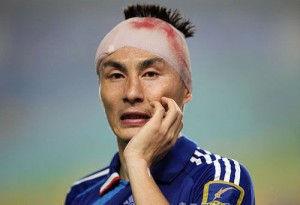Ever since the Chinese national team’s early exit in the Asian Cup 2011, many football fans wondered whether Zhongguodui’s talents are up to challenge of qualification for the World Cup 2014. Many Chinese fans still remember defender Zhao Peng’s dire performance that lead to the defeat of 2-0 to Qatar. Simply speaking, one of the biggest weaknesses of the China national team is the defense.For the past few weeks, the Chinese football arena has been hyped up with the news that former captain, Li Weifeng will be recalled back into the Chinese national team for the Honduras and New Zealand friendly games. The former talisman plays as a defender and the media emphasized that the experience of his 108 national caps would bring definite improvement to the national team.
However, for many of the rational Chinese football fans, no one expected Li Weifeng would even have a chance to return to the team. Branded as a villain in Chinese football. Many fans still have not forgiven his consistent red cards, overly-aggressive performances, and rebellious attitude during his time with the China team.
Li Weifeng was one of the brightest players during China’s first ever World Cup performance in 2002. Affectionately called Datou (Bighead) because of his ability to consistently score headers. Aged 24 at the time of the tournament, he put in an aggressive and tough performance against Costa Rica. China lost the match 2-0, but Li Weifeng’s reputation began to grow within the football world.
After the World Cup, Li Weifeng found himself suddenly transferred to English Premier League team Everton, along with fellow Chinese national team player Li Tie. The pair were introduced in front of the English media, which Li Weifeng commented that it was as “a dream come true to be able to play in the English Premier League”. However, he failed to establish himself into the first team, making two appearance before returning to his homeland.
After he restarted his career in China, his aggressive and violent play became notorious. Even although he was a good and tough tackler, his defensive plays brought many controversies. One of the biggest of which was the China v Japan in the East Asian Football Championship tournament in 2008, when Li Weifeng intentionally choked a Japanese player. His action not only earned him a yellow card, it also led to be him being dubbed a ‘football bully’.
In the later months, Li Weifeng’s accumulation of red cards saw him stripped of the national team captaincy. What made matters worse was that when Li Weifeng played for Wuhan Guanggu in 2008, he was heavily punished with an eight match ban because of his attack on Lu Jiang. Wuhan Guanggu appealed against the decision which ultimately led to the club quitting the Chinese Super League halfway through the season. Many Chinese football fans believed Li Weifeng’s bad attitude was excessive and should be banned from playing again. Li refused to serve the eight match penalty and because Wuhan Guanggu were shut down after quitting the Chinese Super League, but the former captain still needed to find another club to continue his career.
Much to many people’s surprise, South Korea’s Suwon Bluewings suddenly declared that the club had already sealed a deal with Li Weifeng. The defender became the first ever Chinese player to play in South Korea. Li Weifeng eventually made his Suwon debut against Sparta Prague in Hong Kong, but he was red carded and sent off. However, Li realized his temper was beginning to make him more trouble then he was worth and he managed to play in a more clam manner. The Korean fans were worried that Li Weifeng’s bad attitude might cause trouble for their team, but his consistent good performance earned him the nickname “the Great Wall of China”. The Suwon fans actually made a club chant for Li Weifeng, named “Li Weifeng Jiayou!” (Jiayou means GO! in Chinese). Li helped Suwon Bluewings win the Korean FA Cup in 2009 and 2010. However, his contract was terminated by Suwon and he returns to China to play for Tianjin Teda in 2011.
Since Gao Hongbo’s appointment as the Chinese national team manager, the whole team’s philosophy had changed. Gao Hongbo and Arsene Wenger have a similar policy, placing faith in youngsters. Gao opts to offer younger players more chances and rarely recalls players from the older generation, namely Zheng Zhi, Sun Xiang, and Shao Jiayi. But what about Li Weifeng? Li last played for China in the World Cup 2010 qualifier against Australia in 2008, but has not appeared since then.
Following China’s early exit from the Asian Cup in January, and the upcoming World Cup 2014 qualifiers, is it a good time to recall the former captain who has 108 national caps to his name? With the lack of experience in the Chinese team, will Li Weifeng play a ‘Sol Campbell’ type role where he can use his experience to lead the team to success?
With Li named captain by Gao Hongbo for the coming friendly games against New Zealand and Honduras these questions may be answered soon.
Li Weifeng, a villain or a hero?
Tomorrow night, China vs. New Zealand, you make the decision.


Pingback: Yoshinori Muto & Football’s Coldblooded Quest for Global Popularity | The Circular